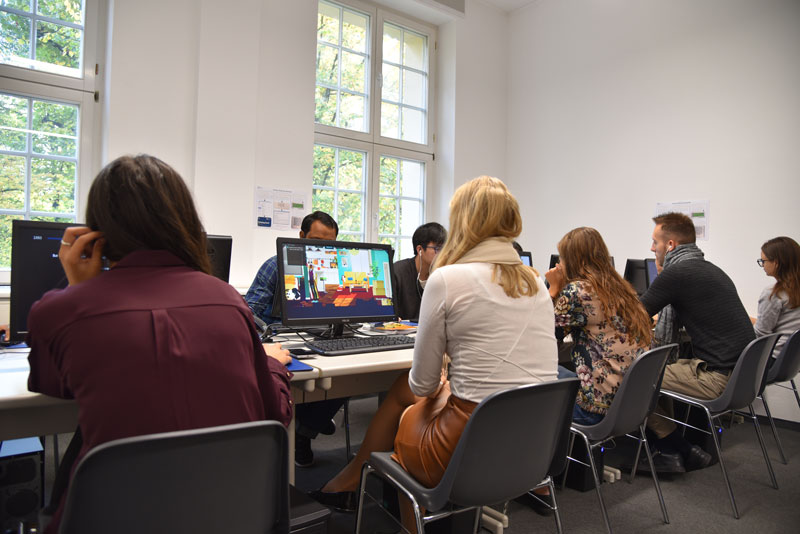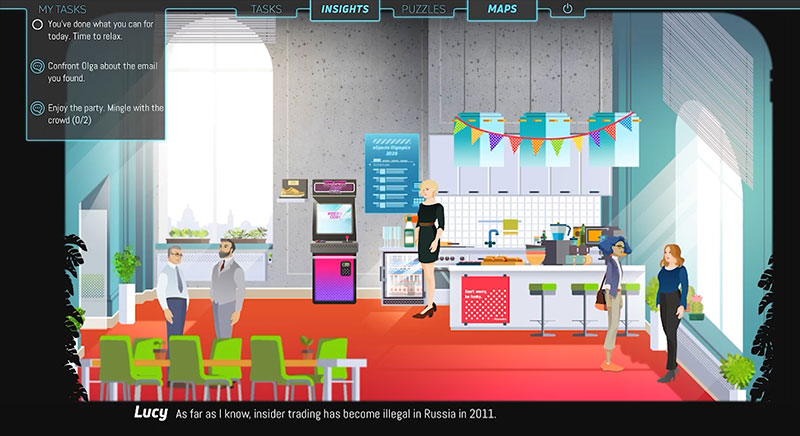The serious game “Moving Tomorrow – An Intercultural Journey” combines traditional education, current research on intercultural management and the most up-to-date pedagogical methods.
How do we go about educating students so that they can cope with a constantly changing and complex working world, as digitalisation takes an ever firmer foothold? This question not only encompasses the content and skills that need to be taught, but also the suitable methods of learning. A serious game is now being used at ESCP to enhance students’ skills. “Moving Tomorrow – An Intercultural Journey” enables students to deepen their intercultural understanding by playing along with an interactive story.

The educational game was developed at ESCP’s Renault Chair of Intercultural Management, under the direction of Professor Marion Festing and PhD candidate Tobias Schumacher. “We have managed to combine current intercultural management research with modern digital methods of learning”, says Professor Festing. She continues: “In research, the construct of ‘national culture’ is questioned very critically. Instead, cultural diversity is accounted for and addressed in an academic sense even within the country concerned. This method is a part of our learning game”. The serious game enables ESCP to strengthen their “Culture for Business” strategy in an innovative manner. This is aimed at educating a new generation of managers and executives to understand and take advantage of the opportunities offered by cultural diversity in companies, even in the digitalised and globalised world of today.
“Moving Tomorrow – An Intercultural Journey” assumes the format of a classic video game. Students play the part of Lucy, an ambitious young woman who is exceedingly interested in various technologies and social entrepreneurship. She works for the Berlin start-up company Runergy, a fictitious company that stands out from its competitors as a result of its strong commitment to corporate social responsibility (CSR) and sustainability.
Over the course of the game, Lucy works in various countries where she gets to know the local culture as well as that of specific companies and groups. Lucy engages in dialogues with other characters (non-player characters) and has to make important decisions which have a significant impact on how the story develops. Should she give important information to strangers and perhaps receive more information in return – or is it better to keep quiet? Will she be able to convince her colleagues that she is up to the task of working at Runergy, or will she have to leave the start-up? And what is more important: her private life or her work life? “We have attached great importance to the diversity and complexity of the characters”, explains Marion Festing.
The game also goes well beyond a simulated group discussion, as students are confronted with difficult decisions, which have an impact on events and how the story pans out. They have to deal with the consequences of their actions. The practical experience incorporated into the game is combined with the latest constructs and theories of intercultural management research with the help of so-called insights. “This enables our students to bridge the gap between theoretical knowledge and realistic situations”, says Professor Festing. At the end of each episode, and as part of the course (a blended learning format), students have the opportunity to reflect on what they have learnt and discuss these topics. Based on initial feedback, a lot of students in the Master in Management and in two specialized Master programmes in Berlin have played the game so far and have thoroughly enjoyed this new way of learning. The idea is to test it in more programmes this year, and to introduce it in Executive Education courses and on a larger scale, in the 2019/2020 academic year.

“Digitalisation will fundamentally change learning, and teaching will no longer take place in the form of traditional lectures. Nowadays, besides gaining knowledge, developing intercultural skills and digital expertise are becoming increasingly important”, says Professor Andreas Kaplan, digitalisation specialist and Rector of the Berlin campus of ESCP. This is but an example of how the business school is taking advantage of opportunities presented by technology in order to enrich its educational programmes.
Campuses